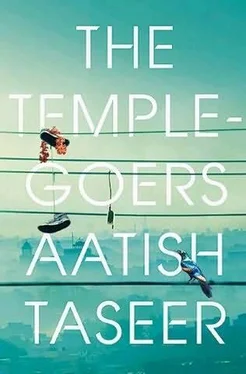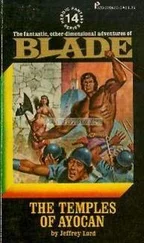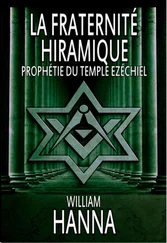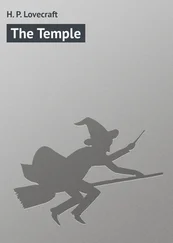‘Victory to the true durbar!’ the congregation yelled back.
The MC’s orange teeth gleamed and he began taking donations, speaking the donor’s name into the mike and blessing him in public.
Aakash and Megha were in line to receive the blessing. Directly behind them stood Amit and his ‘sharp’ wife. Everything was going smoothly until the MC leaned forward and seemed to ask Megha something. Megha took a moment to answer, but when she did, Amit’s wife, now sharper than ever, gasped aloud, ‘How can one lie in the presence of the goddess?’ Aakash’s face went pale even as Megha’s burned with anger. She swung around and there was a loud exchange between the two women, which spilled over into a fight between Aakash and Megha. Aakash seemed to be trying to cool the situation, but soon there was an opening in the crowd and Megha charged out, tears of rage streaming down her face. Aakash dived out behind her and the crowd closed again.
In the meantime, the MC, who had a powerful singing voice, launched into a devotional song, raising his hands over his head and clapping. The pyramid of lamps burned brightly behind him, the colourful mountains shone in the halogen light, and soon the tent-full of people were clapping along and joining him in the song, stopping only to say, ‘Victory to the true durbar.’ It was eleven thirty.
I always knew that I wouldn’t have lasted the night. Within an hour of the singing beginning, my bottom began to hurt and my feet fell asleep. I tried wiggling my toes, but it made no difference. The feeling would subside, only to return with greater force. My restlessness was heightened by Aakash, now with a red and gold Om scarf around his neck, coming in and out of the tent with an expression of deep worry darkening his face. So after another ten minutes of song and hand-raising, I slipped out into the cool night with its spokes of yellow street light. Uttam sat on a chair with his shirt open in the dark. I went up to him and said that we should leave. Aakash was standing near the tent. When I told him I was taking a break but would come back, he said, ‘You’re going now? Fine, go. Looks like everyone is letting me down tonight.’
‘What’s the matter?’
‘What’s the point of telling you? You’re leaving, what help can you be to me?’
‘Where’s Megha?’
‘Does it look as though I know?’
He was like a man who had been struck at by his superior and was now striking down at the man below him. But I had been too low on this food chain for too long and I was beginning to tire of it. I had only myself to blame; I had allowed, I had welcomed my own diminishing. My belief that Aakash could rescue me from being an outsider in India had led me into a kind of self-effacement. The place had been so strong and yet out of reach that now that it felt nearer I wished it to wash over me, even as Aakash wished to define himself against it. But that night I felt my own particularity acutely, and tired of the crowds, and of Aakash’s antics, I questioned him no further. I promised to return, but he didn’t seem interested. It was from his father that I learned that I should return at three thirty a.m., when the story would begin. With this, I left.
When I returned at four a.m., Megha had returned too and the night was entering its second phase. Aakash still stood at the wings where part of the tent flapped open. The anger he had shown me earlier had gone and tiredness like that of a child, joined with some feeling of satisfaction, had taken its place. The red in his eyes brought out their mud colour. Seeing me walk up, his father, standing near Aakash, said, ‘He’s come at just the right moment.’ Aakash seemed pleased to see me and rested his elbow on my shoulder. Megha sat at the other end of the tent with the women of Aakash’s family. Their fight, Aakash explained, had been caused by the MC asking Megha and Aakash whether they had come as a married couple. Megha, feeling she could not lie in the presence of the goddess, had replied, ‘Yes,’ and Aakash’s sister-in-law had overheard. Aakash said that he had tried to cool the situation, but Megha felt he was letting her down. She had apparently got back into her car and driven home. Aakash had had to bring her back in person; and he was now worried that members of her family had discovered where she was. ‘Tonight’s final,’ he kept saying in English. An uneasy peace prevailed between Aakash and Megha, and its mood was mirrored on stage by two children, in liver-coloured satin, playing Krishna and Radha in a pageant of sorts.
The boy wore a black matted wig with painted sideburns and heavy make-up. There was something dark and tantalizing about his exposed armpit hair, seeming to emphasize his adolescence. The girl was plump and well formed, with a reddish-brown dupatta falling from a bun at the top of her head. They had a confrontational relationship, now dancing, now sulking, sometimes they were making up, sometimes she was attacking him with a rolling pin. His favourite expression was an appeal to the crowd, a stunned wide-eyed expression seeming to say, ‘Isn’t she mad?’ before retaliating himself. She never looked at the crowd, more like a soap opera wife than Krishna’s consort. There was a lot of Bollywood-style dancing, which ended with a freeze in godly postures. It was at this point that Sudama appeared.
A group of colony boys had collected at one side of the stage, slouched on chairs, laughing and hanging on to one another. One of them said, as though he’d seen it many times before, ‘This is really something to watch.’ Aakash suddenly became protective of me, and taking me by the hand, led me to one side of the tent, away from the blaring speaker. He gestured to me to sit down, then sat next to me. I felt, as I had many times with him, that in his moments of self-doubt and trouble, he rehabilitated himself through his friendship with me. In these moments he was tender, giving, eager to please, as if my approval could restore him to his normal levels of self-confidence.
A boy with a broken tooth and a thin, expressive face appeared on stage. He wore simple white clothes and his hair was tied with red rubber bands in a long cone. He was Sudama, Krishna’s childhood friend who falls into poverty. Barely able to feed his family, he goes looking for Krishna, who has by then become the King of Dwarka. But when he arrives at his doorstep, the guards prevent this near beggar from going in.
Standing outside a make-believe door, the teenage Sudama began singing a moving song, which at times had the audience in tears. Calling Krishna by all his different names, he sang, ‘Murli vala, your memory would trouble me, my faith in you must not break.’ In the end, he seemed to have succeeded in informing Krishna that he was standing outside his door, because Krishna, having dropped his godly freeze, now rushed out, and taking the broken Sudama in his arms, fell to the ground and began washing his feet. At this moment, Aakash, with tears in his eyes, put his hand behind my neck, massaging it as he once had at the Begum of Sectorpur’s. Forever able to see himself in exalted scenarios, whether it be Bollywood or Dwarka, he said, ‘Remember?’
‘Remember what?’ I said, not wishing to let him down.
‘Remember the time when I washed your feet?’
On stage, Krishna had brought Sudama into his palace and had seated him on his wooden throne with its red felt fabric. Radha had seen this and was enraged. But Krishna by this point had had enough of her and pushed her aside. Some great tension was expressed here, but it wasn’t clear what. The colony boys were both riveted, and judging by their scornful howling, repelled by Sudama’s story. It was easy to imagine how these Indian stories glorifying poverty were not always pleasing to them, easy to see how they were at once familiar and something young people, especially, were a little tired of.
Читать дальше












